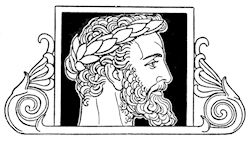Plus d'informations
8vo. (XXIV),211,(1 blank),(43 index),(1 blank),(99 index),(1 blank) p. Modern cloth 17 cm (Ref: EDIT16 CNCE 35852; Schweiger 2,1118; Brunet 5,1092; Graesse 6/2, 263; Ebert 23393) (Details: A vellum look-a-like cloth binding from ca. 1900. See for this date the provenance below) (Condition: Binding somewhat soiled. Both flyleaves browning. Title and last page dust-soiled. Small piece of the right upper corner of the first 2 leaves worn away. Blank right upper corner of 88 pages, somewhere in the middle of the book, cut off. Some foxing. A few allmost invisible pinpoint wormholes at the right edge of the first half. Some wormholes in the margin of 50 pages of the index, sometimes nibbling at a few letters) (Note: The Roman Encyclopaedist Marcus Terentius Varro, 116-27 B.C., was a landowner on a large scale, and member of the senatorial class. Though the bulk of his works are lost, he is considered to be the greatest scholar ancient Rome produced. His writings cover nearly every domain of science, except mathematics. 'A remarkable fact is that he was not a dry pedant, but one whose works included witty and lively sketches of life, side by side with long and very erudite treatises'. (H.J. Rose, 'A handbook of Latin Literature', London 1967 p. 220) The 'de re rustica' is his only complete work that is preserved. Of the 'de lingua latina' (on the latin language), Varro's principle work in 24 books on language, only 6 books remain fairly complete, the books 5 to 10. Book 1 was the introduction, 2/4 were on etymology in general, 5/7 on the etymologies of particular classes of words. 'It hardly need be said that Varro does not group them as a modern philologist would, and has no idea of the immutable or nearly immutable phonetic laws which govern the development of speech'. (Op. cit. p. 222) Books 8/12, are on declension (declinatio), including the additions of suffixes and the like. Books 12/24 were on syntax. The style is plain, but with 'all its faults and its incompleteness, however, the work is of much importance in the history of linguistic study'. (Op.cit., ibid.) 'De lingua latina' is a work of great importance in the history of linguistic studies. § During the Renaissance a renewal of interest in Latin grammar occurred. Medieval vocabulary and terminology, and sloppy grammar were rejected, and the primary of the Latin of the classical period was reasserted. This process was stimulated by the gradual rediscovery of previously unknown texts of classical authors, among which Varro's de lingua Latina was one of the most important. The printed text of de lingua latina is based on an 11th century manuscript Florentinus F, and was first published in 1471. The Spanish humanist Antonio Agustín Albanell, 1517 - 1586, latinized as Antonius Augustinus, is now remembered as the first canon law historian, and not as a classical scholar. This edition of 1557 of 'de lingua latina' of Varro is a reissue of an edition which was first published in Rome in 1554. In it Agustín followed 'the interpolated manuscripts and banished every archaism from the text, a process that met with protest from Turnebus and Scaliger'. (E.J. Sandys, A history of Classical Scholarship, N.Y., 1964, 2,160) This edition, notwithstanding the criticism of both great scholars, remained the standard text till that of Spengel of 1826. Agustín lists on p. 1 the names of the scholars who contributed 'emendationes' to his edition: Pomponius Laetus, Angelus Tifernas, Fran. Rolandellus, Aldus Manutius, Michael Bentinus, Angelus Colotius, Octavius Pantagathus, Petrus Victorius, Ant. Augustinus, Gabriel Faernus) (Provenance: Small green booklabel pasted on the front pastedown of 'George Gregory, Bookseller to H.M. Queen Alexandra, Bath'. George Gregory lives on in the name of the antique prints department, the George Gregory Gallery, of the British antiquarian bookseller George Bayntun. Bayntun tells on his website that George Gregory established his bookshop in Bath in 1846 and proudly proclaimed it to be 'The Worlds Book Store'. He held the Royal Warrant as Bookseller to Queen Alexandra, and was President of the Antiquarian Booksellers Association from 1915 to 1918. George Bayntun and W.J. Crudgington bought the business in 1924 and moved into new premises in Green Street, Bath. § This book was sold by Gregory, so its binding must be older than 1924, or more probable 1918. § This edition must be rare, the last recorded copy in 'Rare Books Hub, formerly the Americana Exchange' dates from 1964) (Collation: *-2*8, A-M8, N6; O-P8, Q6 (leaf Q6 verso blank); Aa-Ff8, Gg2 (leaf Gg2 verso blank) (Photographs on request)

